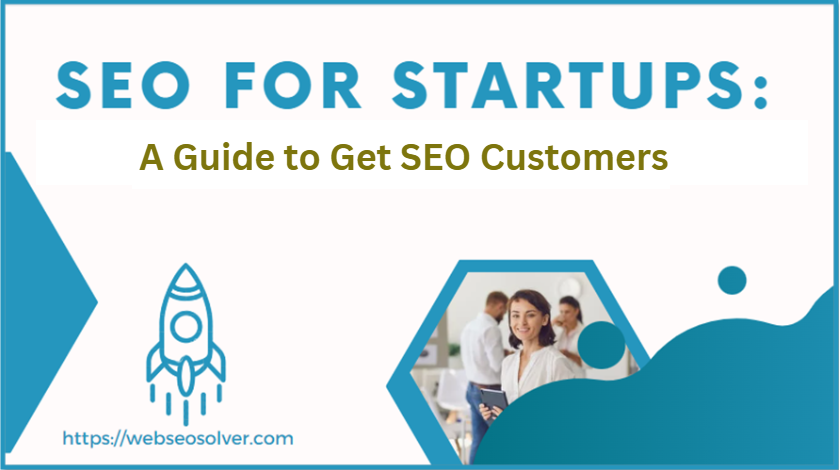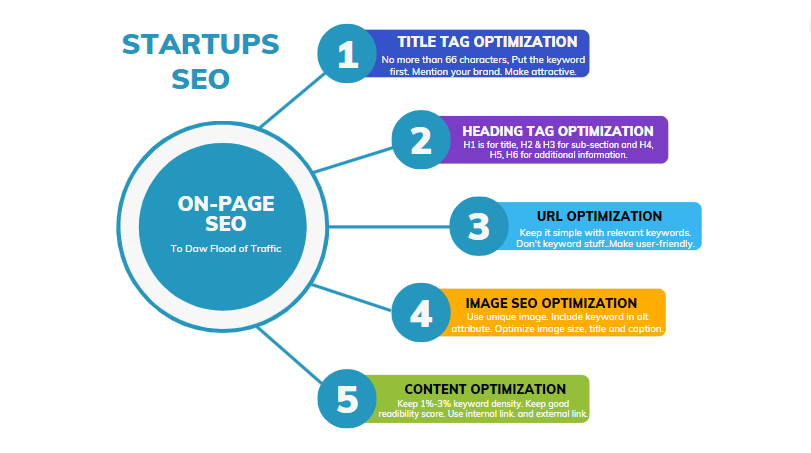
SEO for Startups
Startups encounter several hurdles as a new venture. Whether they will turn into a big profit or suffer a big loss at a point, is a significant concern
Moreover, investing in a risky venture is always a challenge.
But, by adopting digital initiatives with the right SEO planning, startups can build a strong base of customers for business solutions and overcome challenges.
Only 64% of small and medium-sized enterprises (SMEs) have a website, indicating a significant number that do not. [ Target Trend ]
In the competitive startup world, having a functional website is the first crucial need than using only social media to gain huge competitive advantages.
Again, despite having a website, many businesses tend to rely on paid advertising services for quick results, even if it requires investing a significant amount continuously.
But, in fact, it provides them with low ROI.
Instead of largely ad investing or only trying in social media, implementing proper SEO strategies and ranking high in SERP can bring 40% of business revenue from organic search. It not only brings long-term benefits but also provides sustainable growth.
In this blog, we will discuss how startups can use SEO in their website to get customers, from understanding the basics of SEO to implementing a comprehensive SEO strategy.
Whether you’re a brand-new startup or an established business looking to expand your digital presence, this guide will provide you with the tools and knowledge you need to succeed with SEO.
So, let’s get started.
Usually, SEO assists a website to rank higher which in turn drives more traffic to the site that leads to conversion and sales.
There is no special SEO formula. They are common but more helpful for startups to build a strong business foundation in their early stage.
Several steps are involved in implementation.
The steps from implementing to attracting more customers are explained step by step below where every step has secrets to gain. Here are the steps.
- Setting up SEO business goal
- Keyword Research
- Create skyscraper content
- Optimize On-page SEO
- Build High-Quality Backlinks and Authority
- Make your website user-friendly
- Optimize Local SEO
- Build Brand awareness
Table of Contents
1. Setting up SEO business goal
Every startup designs a business goal depending on its type, nature and budget it has and SEO can help to achieve the goal.
Here are some common SEO goals:
- Increasing website visibility and traffic
- Reaching targeted audiences, high conversion, more customers, more sales, and profit
- Enhancing recognition, reputation, and brand awareness
- Achieving good user experience and credibility
- Generating more leads and sales
- Building loyalty and retention
- Improving user-friendly setting
SEO goal and the business goal can be aligned.
To implement startup goals it is essential to decide on the right SEO planning.
For instance, if your business goal is to increase sales, you might focus on optimizing product pages and creating high-converting landing pages.
If you want to reach the targeted audiences and learn their search behaviors you might carry out keyword research that can help you understand the terms and phrases your potential customers use to find products or services like yours. You can then use this information to optimize your website’s content and match users’ search intent.
Remember, without ranking high in SEO organic results the real purpose cannot be achieved.
This is a way the startup can reach the target audiences to increase sales and profits.
Thus, SEO can work with business goals together to achieve the overall objectives of a company.
2. Keyword Research
Keyword research is crucial for startups because it helps them understand what their potential customers are searching for and how they can optimize the content to meet those needs. By doing keyword research –
SEO for Startups
- Startups can Identify relevant keywords
- Understand user intent
- Outrank competitors
To grow customers in business, keyword research is the initial and crucial step for any SEO campaign of startup. Keywords are the direct match of the mind of the human who is making queries on the search bar for finding your products or services.
So, selecting the right keywords for the business site is the chief job of the whole SEO process. If you do a mistake selecting the right keywords your whole labor and investment in SEO will go in vain. You won’t get the result.
So, conduct deep research and calculations before selecting the right keywords. Remember, these words or phrases if ranked alone can bring a lot of traffic and most of them may convert into your customers.
Long-tail keywords are easier to rank and have high conversion rate than short-tail.
You won’t get more customers without high ranking.
SEO will help to rank these keywords.
3. Create skyscraper content
After selecting the right keywords, you need to start creating content. Content is always king.
Creating high-quality content involves a strategic approach.
The aim of creating content is to establish your website or blog as an authority in your niche. And, all your effort to build this authority is only for becoming a magnet for drawing target audiences only.
As a startup, you are in the stage of building a foundation for your business and it is an essential stage to pay attention to growing authority, expertise, and trust in business.
So, firstly, determine who your target audience is, discover their necessary details from Google Analytics, Google Search Console, SERP analysis, etc., and find what type of content they are actually looking for.
In view of all the data, select a skyscraper content topic as a seed or focusing keyword that is relevant to your audience and has a broad scope I mean informational. You can choose transactional intent if needed.
This selection is the foundation of your pillar content.

Keep handy a good number of refined related keywords that you resulted from your keyword research.
Now, break down your topic into subtopics and use subheadings that match your keywords. Afterward, organize them in a logical order. This will make it easier for your audience to navigate and understand.
Research your topic and subtopics thoroughly to gather information and insights from credible sources. You should provide accurate and up-to-date information to establish credibility with your audience.
To satisfy user search intent, write high-quality, informative, and engaging real content.
Long-form content provides valuable information to your audience and also exposure to your expertise. So, create the content in a long form.
Since you are doing all to take advantage of SEO, the content should be well-optimized for search engines by incorporating keywords.
If your content provides the real answers the audiences are looking for, they will be satisfied and won’t need to continue their search elsewhere. They will be more likely to convert into your customers one day.
4. Optimize On-page SEO
SEO means optimizing content to rank higher on search engines’ query results. On-page SEO is a part of it and it is the foundation level of SEO growth. So, startups need to implement this step on every page carefully.
Now that a good number of refined keywords have been collected and great content has been created, it is essential to incorporate the keywords into content according to SEO guidelines. On-page SEO tells about how you do it.
Check out the following list of on-page SEO techniques for startups to enhance website visibility, improve user experience, and boost search engine rankings.
- Page Title Optimization
- Meta Description Optimization
- URL Structure Optimization
- Heading Tags (such as H1, H2, H3, etc.) Optimization
- Content Optimization
- Image Optimization
- Internal Linking
- Social Media Integration
- Schema Markup
- Featured Snippets and Rich Snippets Optimization
- Analytics and Tracking setup
Every point refers to a significant technique of SEO.
They’ll help drive more organic traffic and attract potential customers naturally to the website.

SEO for Startups
5. Build High-Quality Backlinks and Authority
In general, the greater the number of backlinks a page has, the higher the organic traffic it receives from Google.
Establishing strong credibility and trustworthiness in business is crucial for startups to expand their business.
A high authority website that generally achieves backlinks and traffic from other reputable sites naturally ranks well in search results. In the eye of the users these sites are credible and trustworthy.
Backlinks are the cornerstones of increasing the credibility and trustworthiness of a site.
High-quality engaging content is shared and linked to by plenty of websites that naturally rank well and drives significant organic traffic to the site.
Social media can enable effective content promotion, audience engagement, and the cultivation of a loyal following, ultimately drives more backlinks and traffic to the website.
Joining online communities and sharing content is a way to achieve backlinks and targeted traffic.
Guest blogging on relevant websites not only demonstrates your expertise but also helps you acquire valuable backlinks and traffic.
There are plenty of off-page SEO techniques available.
By implementing these techniques, you can create an awesome backlinks foundation for your startups and boost the website’s authority, rank the site higher in search engines, and ultimately drive more traffic to your business.

6. Make your website user-friendly
To create a user-friendly website, it is essential to firstly focus on improving Core Web Vitals.
Core Web Vitals are a set of metrics that include loading speed, interactivity, and visual stability.
A website that performs well on Core Web Vitals is likely to be more user-friendly because it provides a fast and smooth experience for visitors.
Is your site optimized for different devices?
Mobile devices now account for more than half of all website visits at 52.08%, while desktops make up 47.92%. So, a mobile-friendly website is inevitable to gain maximum visitors and conversions.
To make your website more interesting, try adding images and videos between texts. Don’t forget to use a clear call-to-action so users know what to do next.
A website that’s easy to use can attract more visitors and help you rank higher in search engines. Plus, it’s more likely that users will take action, like buying something or filling out a form.
7. Optimize Local SEO
Local customers are important to businesses. It operates in a specific geographic area around the business.
Are you eager to attract more local customers to your business and increase your revenue?
Local SEO is the way to go!
In 2022, an impressive 98% of consumers turned to the Internet to seek information about local businesses, marking a significant increase from the 90% reported in 2019. (Bright Local)
It’s all about reaching the right people in your area by optimizing your website for local keywords.
Don’t forget to claim and complete your Google My Business listing too – this is a great way to showcase your business and encourage customer reviews.
So, hey startups, get started and pay attention to your local audience grow!
You can also create local contents that your local audiences will find relevant and useful. This strategy will catch the attention of more local customers.
Also, by creating partnerships with other local businesses or organizations you can build local backlinks.
Backlinks are a good source to bring traffic to your site.
These are some actionable suggestions for implementing local SEO that will increase your visibility in the local community!
8. Build Brand awareness
Brand establishes trust and credibility in business.
When people become familiar with a brand, they are more likely to visit that website, engage with the content, and ultimately make a purchase. Satisfied customers recommend and ultimately increase customer base.
So, building a brand is an important aspect of marketing. It involves creating a strong identity and making the business known to the target audiences.
Now the question is how to build a brand.
Simply, SEO can build a brand.
When a business appears on the first page of search results through proper SEO practice, it is more likely to be recognized by potential customers, which increases brand awareness.
By publishing high-quality relevant content and optimizing them for search engines, a business can establish itself as an authority in its industry.
Thus, by implementing effective SEO strategies, such as optimizing content, and improving website speed and user experience, businesses can improve customer satisfaction and loyalty, leading to a stronger brand reputation.
Final Thought
Any digital marketing strategy is incomplete without incorporating SEO. SEO is not for only traffic that converts into customers it provides more than you can define. Everything in SEO is a cost-effective and sustainable long-term strategy.
Though sometimes SEO is too competitive and takes a long time to yield results, it is a worthwhile long-term investment that can significantly level up a business’s online visibility, organic traffic, and overall success.
Despite being a completely online system, SEO also holds offline implications that can significantly contribute to the business growth of startups.
So, with the right approach and mindset, any startup can leverage the power of SEO to grow their business and achieve long-term success.
SEO for Startups
Related :
